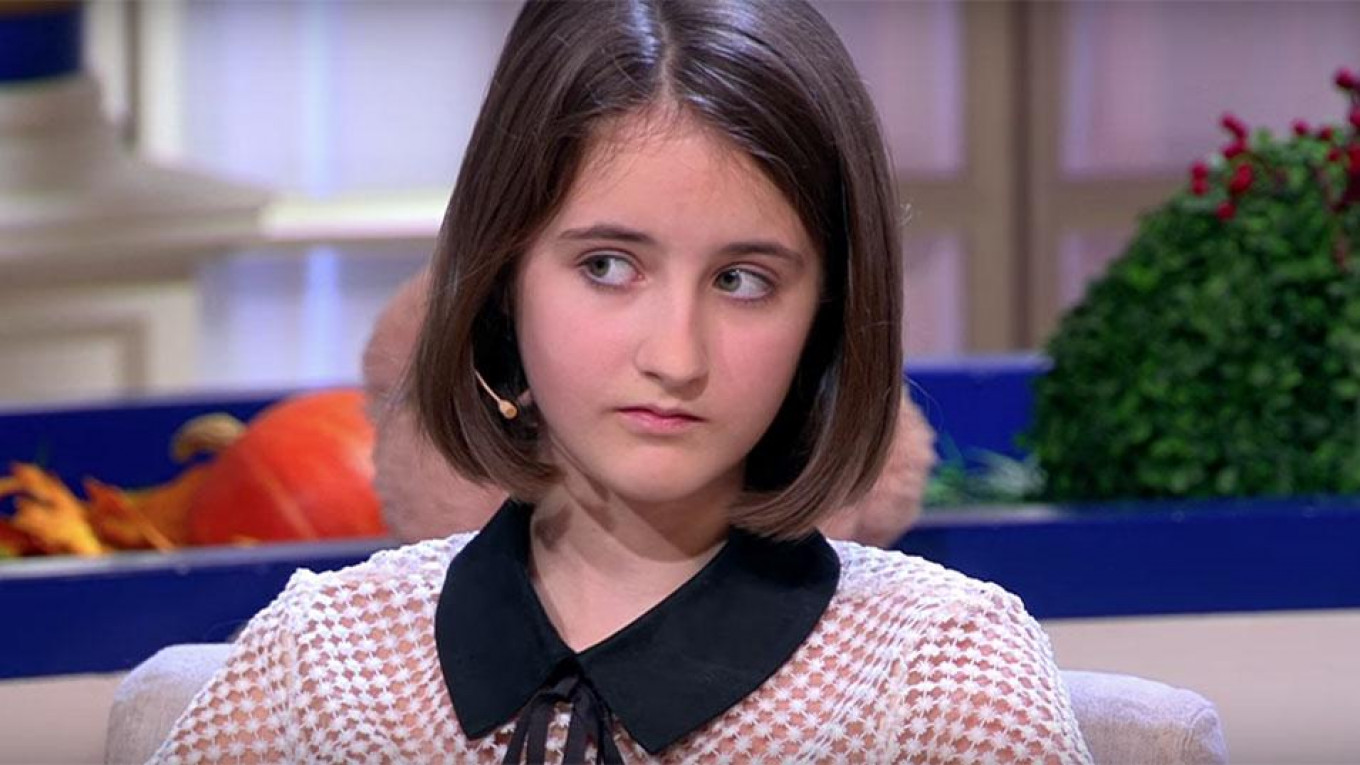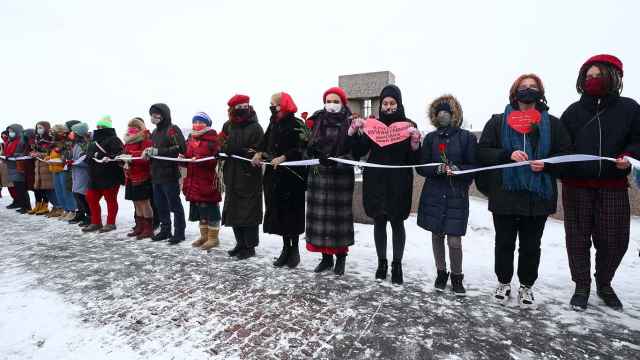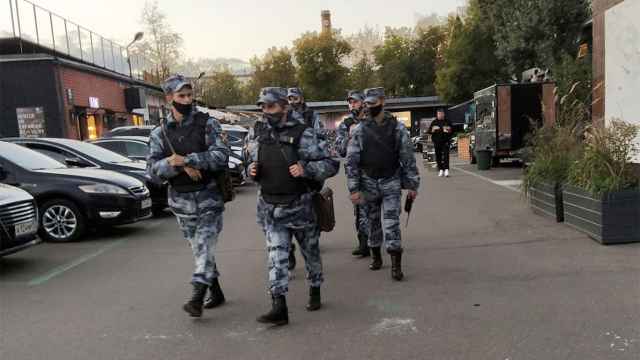When presenters on a state-run channel ridiculed Anastasia for her feminist views live on the country’s most popular dating show, the masses might have been expected to rally to her side. After all, she was just 12 years old.
Instead, Russian internet commenters not only took the presenter’s side, they mercilessly hurled insults at the girl.
“If I had a daughter like this,” one YouTube commenter wrote under a video of the broadcast, “I would have strangled her a long time ago.” “Knock her teeth in,” another added. “Juvenile b-tch,” chimed another.
Often crass, if never boring, the reality show’s mission is to entertain and the over-the-top hosts' ridicule of Anastasia might have been expected. The backlash against her and her campaign against the network, however, has exposed a divide in how the Russian public thinks women should be portrayed on television.
It all began on Oct. 19 when Anastasia, who has declined to publicly reveal her surname, appeared on the hit matchmaking show “Let’s Get Married” alongside her father. The program on Russia’s largest and state-run television network, Channel One, has been one of the country’s favorite programs for a decade. Anastasia’s father, a divorcee, was that episode’s bachelor.
"Let's Get Married" follows a format familiar to Western audiences. Generally, it pits three women against each other to compete for the heart of a bachelor. The three hosts — all women, one of whom is an an astrologer — ask prodding questions and deliver snap judgments about their guests, all in front of a live audience.
When it was Anastasia’s turn, it was clear from the outset she rubbed one of the show’s hosts, Larissa Guzeyeva, the wrong way.
Anastasia started off by telling the panel she knew her father well because the two often discuss important topics of the day, including feminism. She said he deserved an “interesting” woman, someone he could have a conversation with.
For the ten minutes before Anastasia’s father, Anton, was brought out onto the stage, Guzeyeva relentlessly mocked and interrupted the 12-year-old. Even when he was onstage, Guzeyeva called Anastasia “insincere” for talking “like she is a middle-aged woman” and described her as “ten times more terrible than a mother-in-law.”
Anton declined to speak to The Moscow Times, but did say that his daughter is “independent in her views.”
Under a trailer for the episode posted by Channel One on Instagram, Guzeyeva wrote, “Hoooorrrible.” And when the episode was released, it was packaged in horror movie style, with Anastasia stroking a teddy bear to a tune from a soundtrack titled "Twisted Horror."
Reached by phone on Wednesday, Guzeyeva wished a Moscow Times reporter all the success in the world, and that she hopes they “make a lot of money off of this article, just like the girl with her campaign.”
Through it all, Anastasia kept her composure. Then, less than a month later, on Nov. 13, with the help of her father, she posted a video to YouTube decrying how children and women are treated on national television.
She has also started a Twitter account, which now has more than 4,500 followers. The bio reads: “The humiliation of children and women has no place on Channel One.”
In a phone interview on Saturday, as women around the world — though not in Russia — turned out for the second annual Women’s March in protest of U.S. President Donald Trump, whom many view as a symbol of misogyny, Anastasia talked about the prospects of a feminist movement taking hold in Russia.
“There are definitely smart people in Russia who are battling for women’s rights,” she said. “But the audience of a show like ‘Let’s Get Married’ is just not okay with these ideas.”
She noted that after she started her campaign, some of those Russian feminists reached out to support her or stated their support of her publicly, which she described as “very encouraging.”
“It is nice to see that there are people in Russia that have a contemporary point of view,” she said.
One of those feminists, Alena Popova, told The Moscow Times that, at this point, “The Women’s March would be impossible here.”
“The movement is moving forward here in a positive way, but of course it’s only developing,” she said.
Popova sees in Anastasia both a role model for young girls and a “future figurehead” for Russian feminism. She said that her Project W, which works on women’s issues, is doing everything it can to support her.
“We need to uphold her with all our strength,” she said. “It’s important that girls have a role model like Nastia” — a dimunitive for Anastasia — “instead of just Instagram girls.”
“If it was a boy, this would all have been different,” she added. “People would be saying, ‘Look how well he speaks, how well he formulates his views.’”
Like Popova, Zalina Marshenkulova, the founder of the feminist Telegram channel Women’s Power, was thrilled when she found out about Anastasia’s campaign. “The little valkyrie is growing,” she tweeted. “I can retire in peace.”
In a phone interview, Marshenkulova explained that the Russian feminist movement is only at the point where it is trying to get society to understand that women are “human beings.”
“We are only in the first grade, and you can’t get to the fifth grade without going from the first through fourth first,” she said. “But we are finally lifting our heads and battling with stereotypes, so to see Anastasia speaking out is very cool.”
Marshenkulova emphasized that Russian television in general promotes traditional values, especially for women. “The values coming through television are: Success is to marry a rich man, not to work for yourself,” she said. “Seeing Anastasia can help girls believe in themselves.”
Anastasia, who is from St. Petersburg, is not yet thinking that far ahead, however. Asked if she sees herself working on feminist issues in the future, she said that, for now, she is only working on getting “Let’s Get Married” off the air.
A Message from The Moscow Times:
Dear readers,
We are facing unprecedented challenges. Russia's Prosecutor General's Office has designated The Moscow Times as an "undesirable" organization, criminalizing our work and putting our staff at risk of prosecution. This follows our earlier unjust labeling as a "foreign agent."
These actions are direct attempts to silence independent journalism in Russia. The authorities claim our work "discredits the decisions of the Russian leadership." We see things differently: we strive to provide accurate, unbiased reporting on Russia.
We, the journalists of The Moscow Times, refuse to be silenced. But to continue our work, we need your help.
Your support, no matter how small, makes a world of difference. If you can, please support us monthly starting from just $2. It's quick to set up, and every contribution makes a significant impact.
By supporting The Moscow Times, you're defending open, independent journalism in the face of repression. Thank you for standing with us.
Remind me later.







